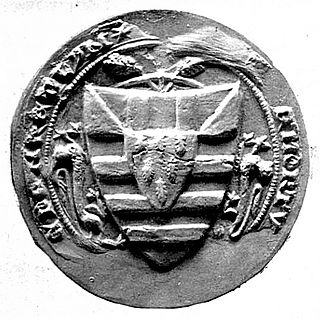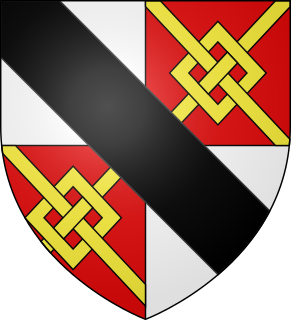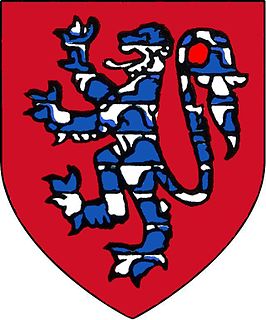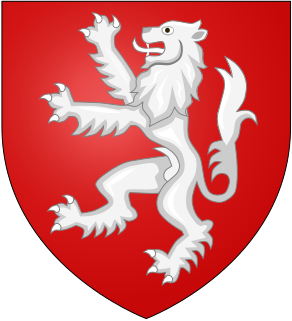 W
WEdmund Fitzalan, 2nd Earl of Arundel was an English nobleman prominent in the conflict between King Edward II and his barons. His father, Richard Fitzalan, 1st Earl of Arundel, died in 1302, while Edmund was still a minor. He therefore became a ward of John de Warenne, Earl of Surrey, and married Warenne's granddaughter Alice. In 1306 he was styled Earl of Arundel, and served under Edward I in the Scottish Wars, for which he was richly rewarded.
 W
WSir William Brabazon, K.B. of Sproxton, Leicestershire was an English politician who represented Leicestershire and Northamptonshire in Parliament.
 W
WRoger Mortimer, 1st Baron Mortimer of Chirk was a 14th-century Marcher lord, notable for his opposition to Edward II of England during the Despenser War.
 W
WHugh le Despenser, 1st Baron le Despenser, also referred to as "the Younger Despenser", was the son and heir of Hugh le Despenser, Earl of Winchester by his wife Isabella de Beauchamp, daughter of William de Beauchamp, 9th Earl of Warwick. He rose to national prominence as royal chamberlain and a favourite of Edward II of England. Despenser made many enemies amongst the nobility of England. After the overthrow of Edward, this eventually led to his being charged with high treason and, ultimately, hanged, drawn and quartered.
 W
WEdward II, also called Edward of Caernarfon, was King of England from 1307 until he was deposed in January 1327. The fourth son of Edward I, Edward became the heir apparent to the throne following the death of his elder brother Alphonso. Beginning in 1300, Edward accompanied his father on campaigns to pacify Scotland. In 1306, he was knighted in a grand ceremony at Westminster Abbey. Following his father's death, Edward succeeded to the throne in 1307. He married Isabella, the daughter of the powerful King Philip IV of France, in 1308, as part of a long-running effort to resolve tensions between the English and French crowns.
 W
WBaron Everingham is an abeyant title in the Peerage of England. It was created by Writ of summons to Parliament of Adam de Everingham of Laxton, Nottinghamshire, on 4 March 1309. It passed to his son Adam but fell into abeyance upon the death of his childless grandson Robert in 1371.
 W
WDavid Flitwick (1281–1353), of Flitwick, Bedfordshire, was an English politician and soldier of the Anglo-Scots Wars who followed in the footsteps of his grandfather, also David Flitwick.
 W
WPiers Gaveston, 1st Earl of Cornwall was an English nobleman of Gascon origin, and the favourite of Edward II of England.
 W
WJohn Harington, 1st Baron Harington (1281–1347) of Aldingham in Furness, Lancashire, was an English peer, created Baron Harington by writ of summons to Parliament dated 1326.
 W
WJohn Maltravers, 1st Baron Maltravers (1290?–1364) was an English nobleman and soldier.
 W
WRoger Mortimer, 3rd Baron Mortimer of Wigmore, 1st Earl of March, was an English nobleman and powerful Marcher lord who gained many estates in the Welsh Marches and Ireland following his advantageous marriage to the wealthy heiress Joan de Geneville, 2nd Baroness Geneville. In November 1316, he was appointed Lord Lieutenant of Ireland. He was imprisoned in the Tower of London in 1322 for having led the Marcher lords in a revolt against King Edward II in what became known as the Despenser War. He later escaped to France, where he was joined by Edward's queen consort Isabella, whom he may have taken as his mistress. After he and Isabella led a successful invasion and rebellion, Edward was deposed; Mortimer allegedly arranged his murder at Berkeley Castle. For three years, Mortimer was de facto ruler of England before being himself overthrown by Edward's eldest son, Edward III. Accused of assuming royal power and other crimes, Mortimer was executed by hanging at Tyburn.
 W
WWilliam Montagu, 2nd Baron Montagu, was an English peer, and an eminent soldier and courtier during the reigns of Edward I and Edward II. He played a significant role in the wars in Scotland and Wales, and was appointed steward of the household to Edward II. Perhaps as a result of the influence of his enemy, Thomas, 2nd Earl of Lancaster, Edward II sent him to Gascony as Seneschal in 1318. He died there in October of the following year.
 W
WJohn (I) de Mowbray, 2nd Baron Mowbray was the son of Roger de Mowbray, 1st Baron Mowbray. Lord of the manors of Tanfield and Well, Yorkshire.